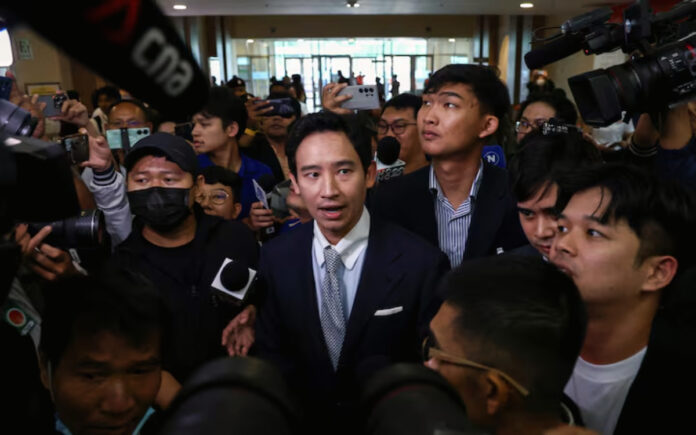Bangkok: Thailand’s Constitutional Court has ordered the dissolution of the anti-establishment opposition party Move Forward, ruling that its campaign to amend a law protecting the monarchy from criticism threatened the democratic system. The ruling, issued on Wednesday, represents a significant setback for the party, which won the most seats in the 2023 election.
Move Forward’s dissolution adds to the ongoing struggle between Thailand’s major political parties and a coalition of influential conservatives, elite families, and the royalist military. While the court’s decision could alienate the millions of young, urban voters who supported Move Forward’s progressive agenda, its practical impact may be limited to imposing 10-year political bans on the party’s 11 executives.
Following the ruling, Move Forward’s leaders announced plans to form a new party, reviving their previous strategy from 2020 when their predecessor, Future Forward, was dissolved over campaign finance issues. Deputy leader Sirikanya Tansakul assured supporters that the new party would continue to uphold the same core ideology and fulfill its promises.
“We will not abandon our dream and our mission and duty that was tasked to us,” Tansakul stated. “As long as the people are alongside us and support us to change this country, we will continue forward.”
The United States, a key ally of Thailand, expressed concern over the ruling, emphasizing that it disenfranchises millions of voters and urging the Thai government to ensure inclusive political participation.
Also Read | Ukraine Penetrates Russian Border Near Key Gas Hub
‘Dangerous Precedent’
The verdict follows a January decision by the same court, which ordered Move Forward to abandon its plan to reform a law on royal insults, deeming it unconstitutional. The court’s unanimous decision on Wednesday cited this earlier ruling, asserting that Move Forward’s actions had used the monarchy to gain electoral advantage, thus putting the palace in conflict with the people.
“The action of the accused is therefore an action that may antagonize the democratic system with the king as the head of state,” the judges stated.
King Maha Vajiralongkorn, who has been on the throne for seven years, is regarded as being in a position of “revered worship” under the Thai constitution, with insults toward the monarchy punishable by up to 15 years in prison.
Move Forward’s leaders argued that the ruling sets a dangerous precedent for constitutional interpretation and denied any intention to undermine the monarchy or commit treason.
In a strongly worded statement, U.S. State Department spokesperson Matthew Miller criticized the ruling, stating, “The Constitutional Court’s decision also jeopardizes Thailand’s democratic progress and runs counter to the aspirations of the Thai people for a strong, democratic future.”
Also Read | Disney Forecasts Lower Park Demand Amidst Strong Streaming and Film Earnings
Critical Juncture
Move Forward’s influential rivals had previously united to block the party from forming a government. Despite this setback, the progressive movement remains a significant political force, advocating for military reform and dismantling monopolies—policies that challenge powerful established groups.
Supporters of Move Forward have called for protests against the court’s decision, with some expressing deep disappointment at the ruling’s implications for Thailand’s democratic institutions.
“I feel like we have hit rock bottom,” said Sirinapa Veillet, a 58-year-old supporter. “It feels like we have no support left, none at all.”
In addition to Move Forward’s disbandment, political uncertainty in Thailand is heightened by ongoing disputes within the military-backed establishment and the populist ruling party, Pheu Thai. The Constitutional Court is expected to decide next week on whether to dismiss Prime Minister Srettha Thavisin over his appointment of a lawyer with a controversial past. The outcome could further destabilize Thailand’s political landscape, impacting economic growth and investor confidence.



